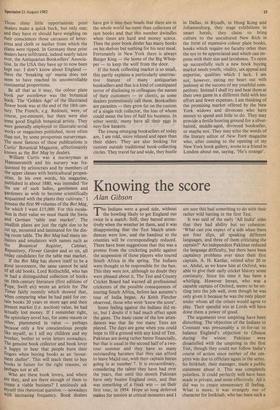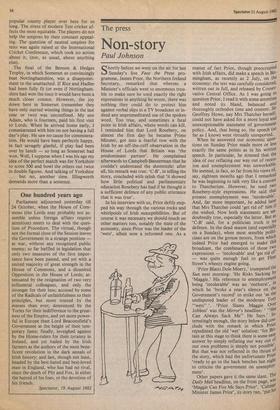Knowing the score
Alan Gibson
The Indians were a good side, without the bowling likely to get England out twice in a match. Still, they batted attrac- tively when the weather let them, and it was disappointing that the Test Match atten- dances were low, and the handout to the counties will be correspondingly reduced. There have been suggestions that this was a protest from the cricketing public against the suspension of those players who toured South Africa in the spring. The Indians were thought to be responsible for the ban. This they were not, although no doubt they were pleased about it. The Test and County Cricket Board had warned all professional cricketers of the possible consequences of touring South Africa, before last autumn's tour of India began. As Keith Fletcher observed, those who went 'knew the score'.
Some feeling against the Indians did ex- ist, but I doubt if it had much effect upon the gates. The basic cause of the low atten- dances was that far too many Tests are played. The days are gone when you could hope to fill a ground with any kind of Test. Pakistan are doing rather better financially, but that is usual in the second half of a two- tour summer and they have so many outstanding batsmen that they can afford to leave Majid out, with their captain Imran going in at number 7. It is extraordinary, considering the talent they have had over the years, that until this month Pakistan have only beaten England once, and that was something of a freak win — on their first tour, in 1954. Hope so long deferred makes for tension at critical moments and I am sure this had something to do with their rather wild batting in the first Test.
It was said of the early 'All India' sides that they had ability but no cohesion: `What can you expect of a side when there are four slips, all speaking different languages, and three of them criticising the captain?' An independent Pakistan reduced the language difficulty, but there have been captaincy problems ever since their first captain, A. H. Kardar, retired after 20 or so. Abdul, as we knew him at Oxford, was able to give their early cricket history some continuity. Since his time it has been a whirligig. However lmran, who was a capable captain of Oxford, seems to be set- tling into the job well, even though he was only given it because he was the only player under whom all the others would agree to play. Their spendid win at Lords will have done them a power of good.
The arguments over umpiring have been disturbing. The objection of the Indians to Constant was presumably a tit-for-tat to balance England's objection to Ghouse during the winter. Pakistan were dissatisfied with the umpiring in the first Test, though they could not follow India's course of action since neither of the um- pires was due to officiate again in the series. So Intikhab, their manager, made a public statement about it. This was completely pointless. It could perfectly well have been made in private, and more effectively. All it did was to create unnecessary ill feeling. What is more, it was strangely out of character for Intikhab, who has been such a popular county player over here for so long. The stress of modern Test cricket af- fects the most equitable. The players do not help the umpires by their constant appeal- ing. The question of neutral umpires for tests was again raised at the International Cricket Conference, which took no action about it, (nor, as usual, about anything else).
The final of the Benson & Hedges Trophy, in which Somerset so convincingly beat Nottinghamshire, was a disappoint- ment to the unattached. If Rice and Hadlee had been fully fit (or even if Nottingham- shire had won the toss) it would have been a much closer contest. However, the joy down here in Somerset (remember they have only started winning things in the last year or two) was unconfined. My son Adam, who is fourteen, paid his first visit to Lords. When he arrived home early, I commiserated with him on not having a full day's play. He saw no cause for commisera- tion. He would have been perfectly happy, in fact savagely gleeful, if play had been over by lunch — so long as Somerset had won. Well, I suppose when I was his age my idea of the perfect match was for Yorkshire to score 500 and bowl the others out twice in double figures. And talking of Yorkshire ... but no, another time. Illingworth demands more than a sentence.



































 Previous page
Previous page